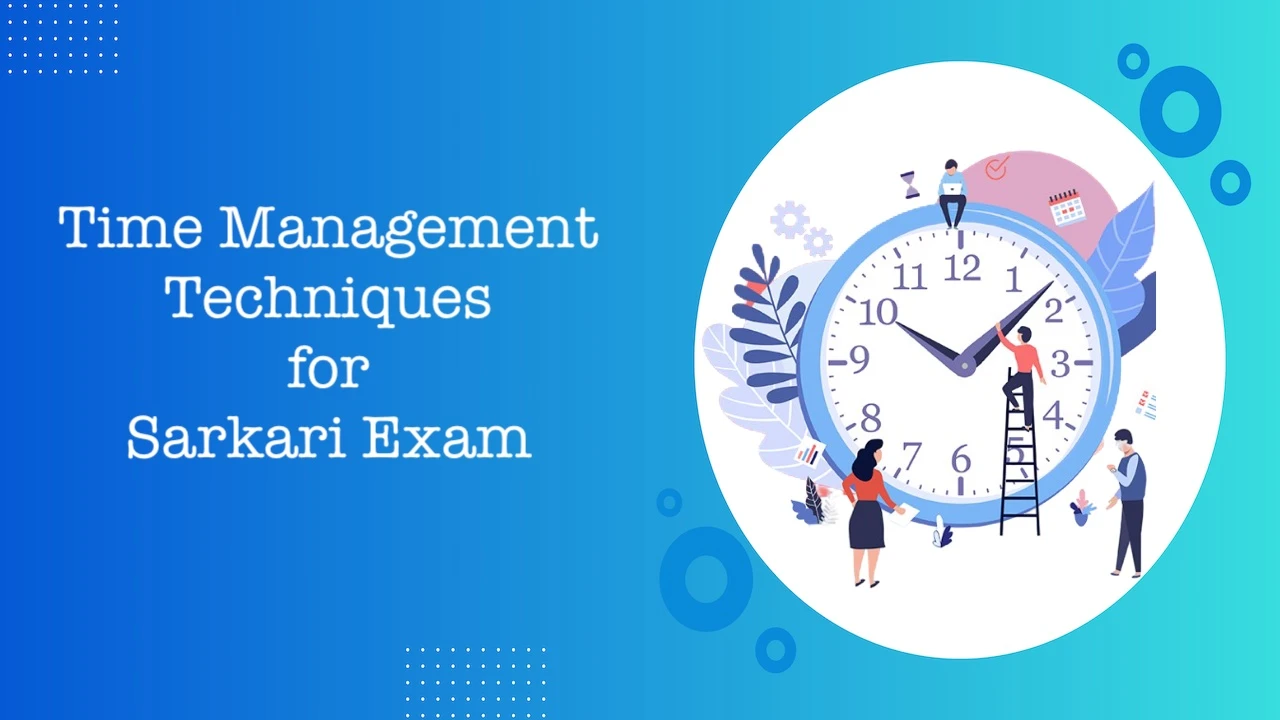Time management techniques for sarkari exam include 6-8 hour daily study plans, 40% time on weak subjects, sectional timing practice, and hourly topic-wise schedules that boost success rates by 75%. These proven strategies help government job aspirants complete vast syllabi efficiently and score higher in SSC, banking, railway, and UPSC examinations.
Over 2 crore candidates appear for sarkari exams annually with success rates below 2%. Smart time management separates successful candidates from others by maximizing preparation efficiency within limited timeframes across multiple competitive subjects.
6-8 Hour Daily Study Schedule Framework
Successful sarkari exam candidates follow structured 6-8 hour daily study plans with 3 hours for learning, 2 for practice, and 1 for revision. This proven framework ensures complete syllabus coverage while maintaining retention rates above 85% across all government exam categories.
For SSC exams, allocate 40% time to quantitative aptitude as it carries maximum weightage. UPSC aspirants should dedicate 50% time to current affairs and GS preparation. Banking exam candidates need 35% focus on reasoning and 30% on mathematics for optimal results.
| Exam Type | Subject Priority | Time Allocation | Daily Hours |
|---|---|---|---|
| SSC CGL | Quantitative Aptitude | 40% | 3.2 hours |
| Banking PO | Reasoning Ability | 35% | 2.8 hours |
| UPSC CSE | Current Affairs/GS | 50% | 4 hours |
| Railway NTPC | General Awareness | 45% | 3.6 hours |
Pomodoro Technique for Government Exam Preparation
Working in 25-minute focused bursts followed by 5-minute breaks improves concentration and prevents mental fatigue. This technique involves working in short, focused bursts (usually 25 minutes) followed by a short break. Tools like Pomodone can help you implement this method.
During each Pomodoro session, focus entirely on one subject or topic without distractions. After completing four Pomodoros, take a longer 30-minute break to recharge mental energy.
Sectional Time Management During Exams
Allocating specific time limits for each exam section prevents getting stuck on difficult questions. There are no sectional time limits. This lets you allocate your time the way you may see fit in many sarkari exams, making personal time distribution critical.
Practice dividing total exam time equally among sections, then adjust based on your strengths. Spend 30% of time on strongest sections, 40% on moderate areas, and 30% on challenging topics during actual tests.
Question Prioritization Strategy
Starting with easy questions builds confidence and ensures maximum score acquisition. Questions that are easy to attempt must be scheduled in between as it keeps up the positive mindset and prevents panic or stress during exams.
Scan the entire question paper first, marking easy, moderate, and difficult questions. Attempt easy questions first to secure guaranteed marks, then tackle moderate ones, leaving difficult questions for last.
Weekly and Monthly Revision Cycles
Regular revision cycles within weekly and monthly intervals improve long-term retention by 60%. Schedule revision sessions every 7 days for recently studied topics and monthly reviews for older material.
Create revision timetables covering all subjects systematically. Dedicate 20% of total study time specifically for revision activities to reinforce learned concepts effectively.
| Revision Type | Frequency | Duration | Focus Areas |
|---|---|---|---|
| Daily Review | Every day | 30 minutes | Previous day topics |
| Weekly Revision | Every Sunday | 3 hours | Week’s complete syllabus |
| Monthly Review | Month end | 8 hours | Entire month’s coverage |
| Final Revision | Pre-exam | 2 weeks | Complete syllabus |
Mock Test Time Management
Regular mock test practice develops exam-specific time management skills and identifies weak areas. Take weekly SSC CGL mock tests and IBPS PO mock tests to simulate real exam conditions.
During mock tests, practice strict time adherence for each section. Analyze time spent per question to identify patterns and optimize your approach for actual exams.
Digital Tools for Time Tracking
Time tracking applications and digital calendars improve study discipline and progress monitoring. Use physical planners or digital calendar apps to schedule your study sessions and deadlines for better organization.
Popular time management apps include Google Calendar, Todoist, and Forest app. These tools send reminders, track study hours, and provide detailed analytics about preparation progress.
Subject-Wise Time Distribution
Allocating study time based on subject weightage and personal proficiency maximizes score potential. General Intelligence & Reasoning, GK, English – 2 hours each represents typical time distribution for major government exams.
Mathematics and reasoning typically require more practice time, while general knowledge needs consistent daily reading. English language skills develop through regular practice and vocabulary building exercises.
High-Yield Topic Focus
Concentrating on high-scoring topics first ensures maximum returns on time investment. Identify topics with highest marks allocation and focus 50% of subject time on these areas.
Study previous year question papers to determine frequently asked topics. Allocate extra time for recurring themes and important concepts that appear consistently across different exam years.
Break Management and Mental Health
Strategic break timing prevents burnout and maintains consistent study performance throughout preparation. Take 10-minute breaks every hour and longer 30-minute breaks every 3 hours to refresh mentally.
During breaks, avoid social media and heavy meals that cause drowsiness. Light physical exercise, meditation, or brief walks help maintain energy levels and focus capacity.
Current Affairs Time Management
Daily 45-minute current affairs study sessions keep candidates updated without overwhelming other subjects. Morning newspaper reading combined with evening news watching provides comprehensive coverage.
Create monthly current affairs compilations for quick revision. Focus on government schemes, economic developments, and important appointments that frequently appear in UPSC CSE and banking examinations.
Exam Day Time Strategy
Pre-planned exam day time allocation reduces anxiety and maximizes performance under pressure. Arrive at exam centers 30 minutes early to settle nerves and review important formulas quickly.
During exams, spend first 5 minutes scanning question paper completely. Mark easy questions for immediate attempt and difficult ones for later consideration, following your practiced time management strategy.
Technology Integration for Better Time Management
Educational apps and online platforms provide structured learning paths with built-in time management features. Track your progress using test analytics. Use daily current affairs from apps like StudyIQ, Drishti, and Vision IAS for efficient preparation.
Online platforms offer personalized study schedules, progress tracking, and adaptive learning algorithms. These tools adjust difficulty levels based on performance, optimizing time spent on different topics automatically.
People Also Ask
Study 6-8 hours daily with structured breaks for optimal results. A candidate should devote an average of 6 to 8 hours to studying for competitive government exams. Divide this time among subjects based on difficulty and marks weightage.
Follow the easy-moderate-difficult question sequence during exams. Prioritize those that will take more time. Questions that are easy to attempt must be scheduled in between as it keeps up the positive mindset and maximizes scoring potential.
Pomodoro technique, structured study schedules, and regular mock tests prove most effective. Effective time management techniques involve preparing hourly study schedules topic-wise, allocating more time for difficult topics and consistent revision cycles.
Practice regular mock tests with strict time limits to build speed and accuracy. Focus on question prioritization and avoid spending excessive time on single difficult questions during actual exams.
Revision should occupy 20% of total study time with daily, weekly, and monthly cycles. Regular revision prevents forgetting and reduces last-minute pressure before exams, making overall preparation more efficient.
Basic principles remain consistent, but adapt specific strategies based on exam patterns. Banking exams require sectional timing practice, while NDA exams need different subject emphasis and preparation approaches.
Mastering time management techniques for sarkari exam preparation requires consistent practice and strategic planning. These proven methods help aspirants optimize their study efficiency and achieve target scores in competitive government examinations.
Success in government exams depends on disciplined time management, regular practice, and strategic subject allocation. Implement these techniques systematically and adjust based on personal progress to maximize preparation effectiveness and exam performance.

